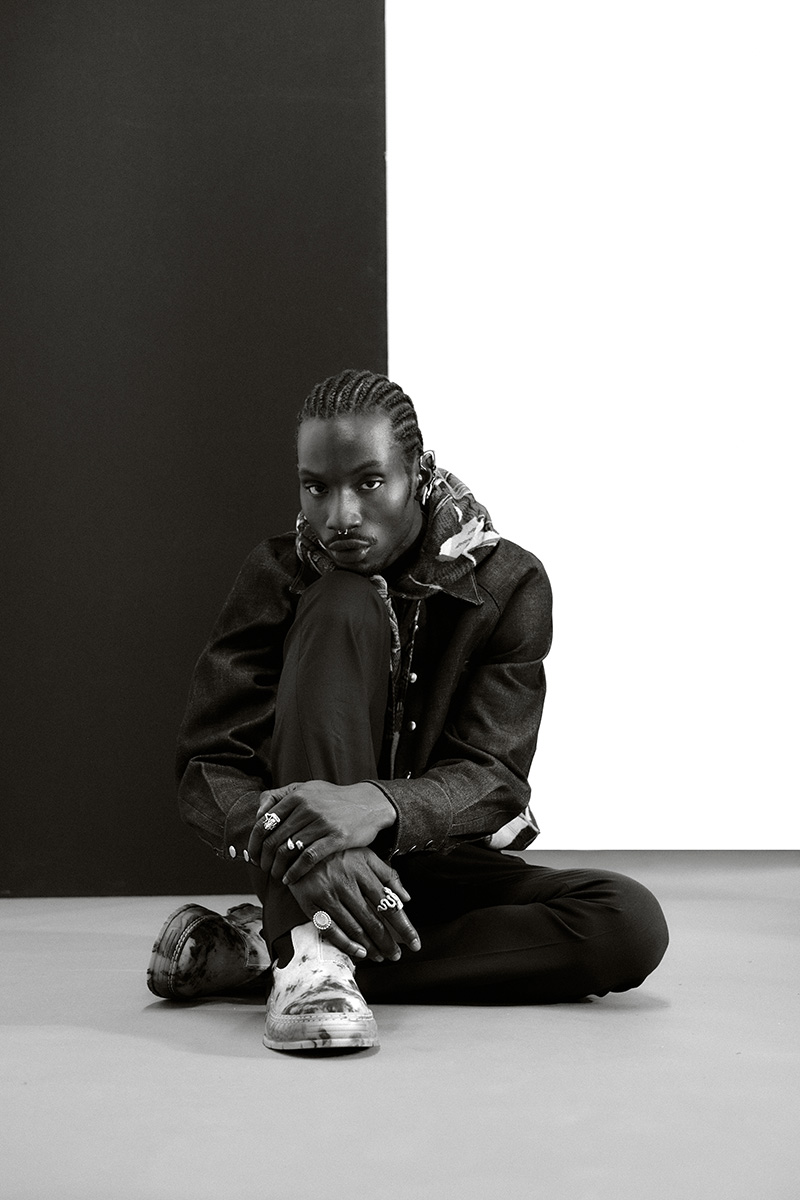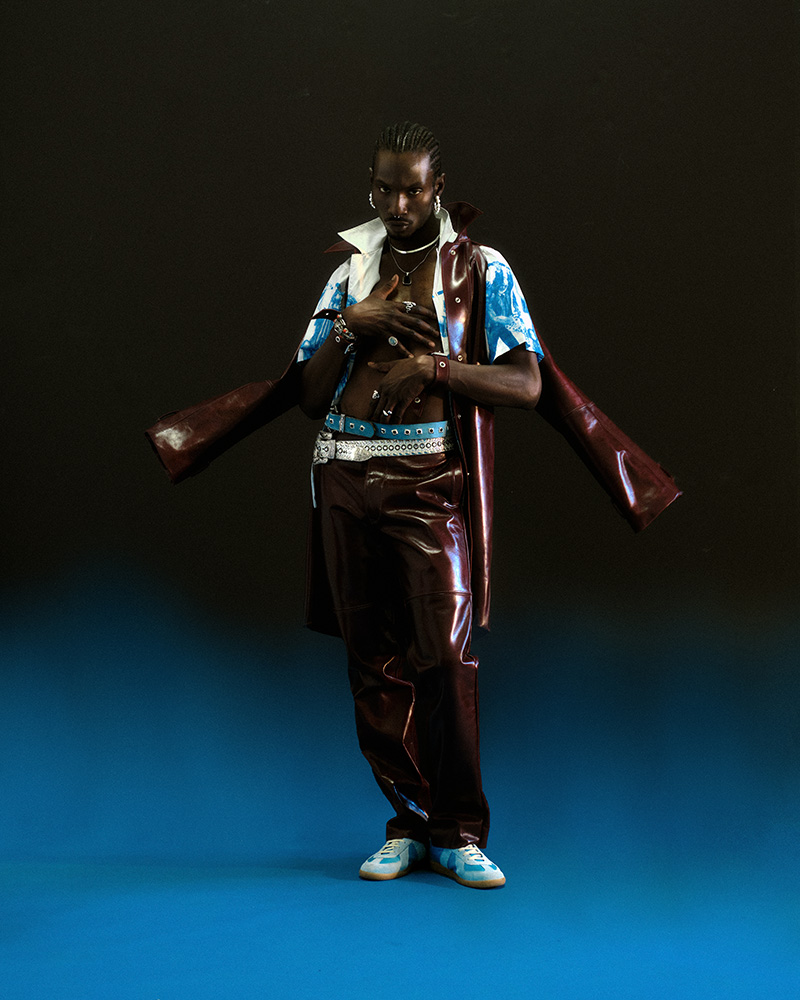
Adonis Bosso is a man of many talents as a model, singer, and creative yet his latest role of a father has taken precedence. Based in Toronto, the Ivorian-Canadian co-parents with model Slick Woods their son, Saphir, both consciously instilling in him the confidence to be grounded and independent, in a turbulent, unpredictable world. “He’s only three, but I can tell already that he is very emotionally intelligent,” Bosso determines. “We also take time to express how we feel about things and be able to let it go and not hold on to that feeling and stress too long.” Prioritizing the importance of mental health has been essential in how Bosso has navigated the modeling industry and developed his authentic self as a successful model and sexually fluid, Black man. After surviving a harrowing car accident that he, fortunately, walked away from, Bosso has a new perspective on life and the value of mental soundness. With images shot by Nigerian Canadian William Ukoh, we spoke to Bosso in Toronto on the importance of mental health in the Black community, breaking generational curses, and raising his son to be in tune with his emotions.
Stylist – Lebani Osmani | Grooming – Jasmine Merinsky | Photographer’s assistant – Amani Yasmin
Editor – Irene Ojo-Felix
How did you first get scouted?
I can’t say I just got scouted; I pursued modeling as an escape route from home. I wanted to leave Montreal, and I had big dreams but I never knew how they would come true. After high school, a girlfriend of mine was modeling and she told me I should try it out and after going to her agency, I got signed almost right away. It wasn’t a good agency so they closed after a year, but it was my 1st foot in the door and it made me want to keep going on a greater level. I signed to my current mother agency, Montage in 2009, and then in 2012, I signed to DNA and slowly conquered the world.
You recently shared on Instagram that you got into a car accident that you walked away from. Take us back to that experience and what lesson you took from it.
It was definitely a humbling moment in my life. A couple of weeks ago, I was driving in Toronto on a snowy and rainy night. I had a long day and after putting my son to bed, I decided to go to the store and have a little daddy moment. At the light, I started to make a left turn and my car started slowly swerving off the road. I thought to myself, “damn, the car is going to flip.” Surely enough, the car did flip forward, hit the roof, hit all sides, and fell back on all four wheels. There was a split second when I was in the air upside down that I thought, I hope I don’t get stuck upside down and have to crawl out of the car. I had my seatbelt on, so the whole thing felt like a roller coaster. I was in shock. I thought of how bad it could have been and I can only have gratitude. I slowly drove the busted car back to my parents and stayed in shock for a few days. I can still hear the window shattering. At that moment, I realized for the first time that if anything were to happen to me, I wouldn’t be able to be in my son’s life. I realized that my well-being also affected his. It made me cherish the moment I spent with my loved ones so much more. I enjoy the sunlight and rain a little more now.
How big is the pressure in the business to always be “perfect”? How do you deal with it best?
It’s funny because in this industry where we focus so much on luxury, people often lack imagination. To obtain certain things, you have to look the part. I feel like privilege has been given to certain male counterparts to be less groomed and tailored. I always thought that I had to represent my people in the best light as a Black model. I also had to conform to a certain aesthetic acceptable in fashion for a long time. With time our representation in the industry showed more variation in our identity. I still believe we are required a certain amount of perfection. I used to tailor to that ideology for the sake of my pockets but got to a point where I don’t care anymore. I just want to be authentic, not perfect.

You formally announced your musical career and came out publicly as sexually fluid in 2020 — how did sharing these facets of yourself, in such a big year for us all, expand your ambitions beyond modeling?
I think 2020 was a very revealing year. A lot of veils were lifted, and we all got the time to sit with ourselves and reflect on who we are and who we wanted to be…I wanted to be me. My authentic, unfiltered self. It’s important to show my son and the next generation that they can be themselves and it starts with us.
My true passion is creating. I used to put on concerts for my parent growing up. I also trained in hip hop and contemporary dance, and for as long as I can remember, I could draw. In my high school days, I was a music freak. I was up all night on music blogs for the latest drops and unreleased tracks. Around when I was 18, a trauma made me shut music from my life. When I moved to LA in 2016, music was reintroduced to me in a way I couldn’t deny. Shortly after, I got a record deal in 2018 and 2020 was when I started releasing music again. It’s been a beautiful journey. The events of 2020 changed the initial trajectory I had envisioned, yet it gave me time to tighten up. I even think I made some of my best music during the pandemic, but for that, you might have to wait until summer…
“It’s important to create a space for Black boys to just be and evolve freely, spiritually, and mentally.”
Has raising your son, Saphir, influenced how you think about mental health and safe spaces? What lessons do you hope to teach him?
I studied special care counseling and have a center for youth under the autism spectrum. It was all inspired by my brother, who has autism as well. Knowing how hard it was for my family, we wanted to help other families in our situation. Mental health care has a special place in my family and the importance is something I want to pour into my son. He’s only three, but I can tell already that he is very emotionally intelligent.
It’s important to create a space for Black boys to just be and evolve freely, spiritually, and mentally. I have been really into conscious parenting and allowing my child to be independent and think for themselves. I believe a sense of autonomy helps create a sense of self-confidence. We are slowly adding meditation to our routine. I believe having these tools at a young age can help keep you grounded when the brain and emotions get cloudy. We also take time to express how we feel about things and be able to let it go and not hold on to that feeling and stress too long. Gotta get that “bad guy “out.
How has social media offered you a platform to connect with others who share similar mental health challenges?
It’s a community. Social media is a tool like any other, it could be good or bad depending on what you do with it. I was able to connect with people I have had healing moments and conversations with. I met people who have helped me make a real breakthrough in my life that has helped me heal certain parts of me. You can really find your tribe on social media
Do you ever feel uncomfortable or pressured to post online?
I definitely did at a point. The thing is like everything; you have to do it in moderation. Social media gives us a dopamine rush from the outside validation, so it’s easy to get addicted and self-conscious. The key is to know that we are worth more than these little hearts and comment bubbles. Knowing your value makes it so that you can’t shape your actions, persona, or mood over the validation you get online. Know that you are enough, viral post or not.
Do you think attitudes toward mental health among Black men are changing? Why or why not?
I believe Black men are more open now. For a long time, society and media have dictated what it means to be Black. I think the community is realizing slowly that a lot of prejudices, trauma, and stigma that we hold have been inherited from our oppressors. There are more conversations about healing our inner child and breaking generational curses. We get a little wiser and a greater understanding of self with every generation. I think this is why more people of color are open and comfortable with things like therapy and focusing on mental health.
What do you think are some of the things keeping Black men from seeking out professional help with mental struggles? What advice would you give to other models struggling with self-acceptance?
A lot of it has to do with fear of judgment. Unfortunately, in the Black community, Black men are seen as providers and have little room to be in tune with their emotions. We are taught involuntarily to keep all our feelings inside and bottle them up. We are told that there is shame in certain aspects of us and that our value is attached to our ability to provide. It’s a lot of pressure that we end up internalizing. We need a sense of community and brotherhood so we can all feel that we aren’t alone in our struggle. Even to other models! I want them to understand that we are all in the same boat. We are in an industry where we are judged to see if our appearance fits a creative vision, and we can get to a point where we take it personally. I was able to find my place in the modeling world, and I feel that there is a place for everyone. It may sometimes feel like it happens overnight for some, but it’s never the case. Keep faith in yourself and know that your individualism is your superpower in modeling and the world.



